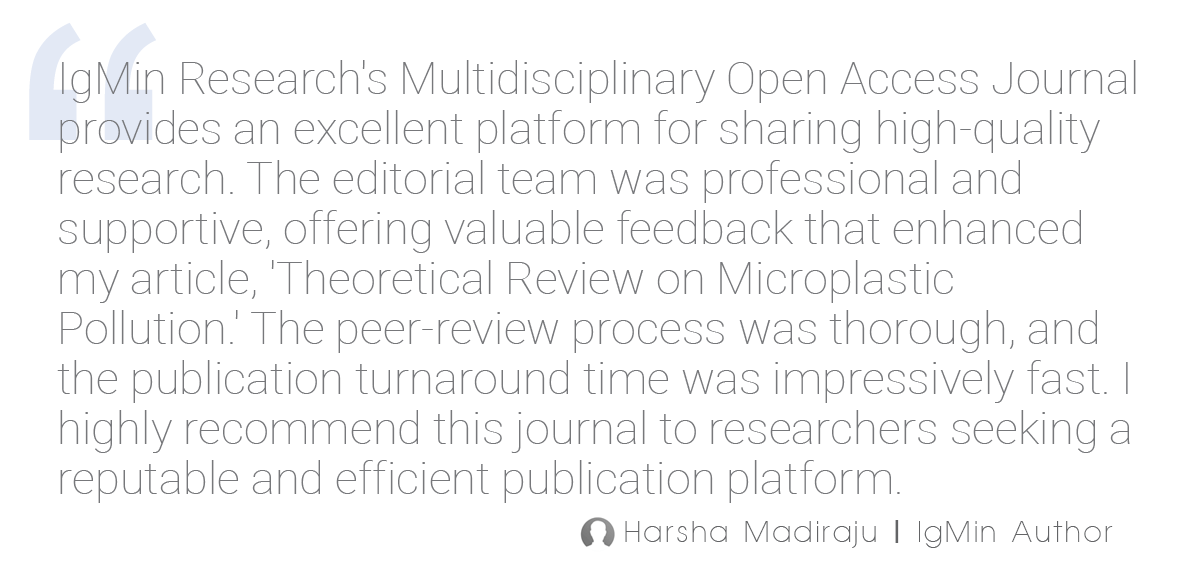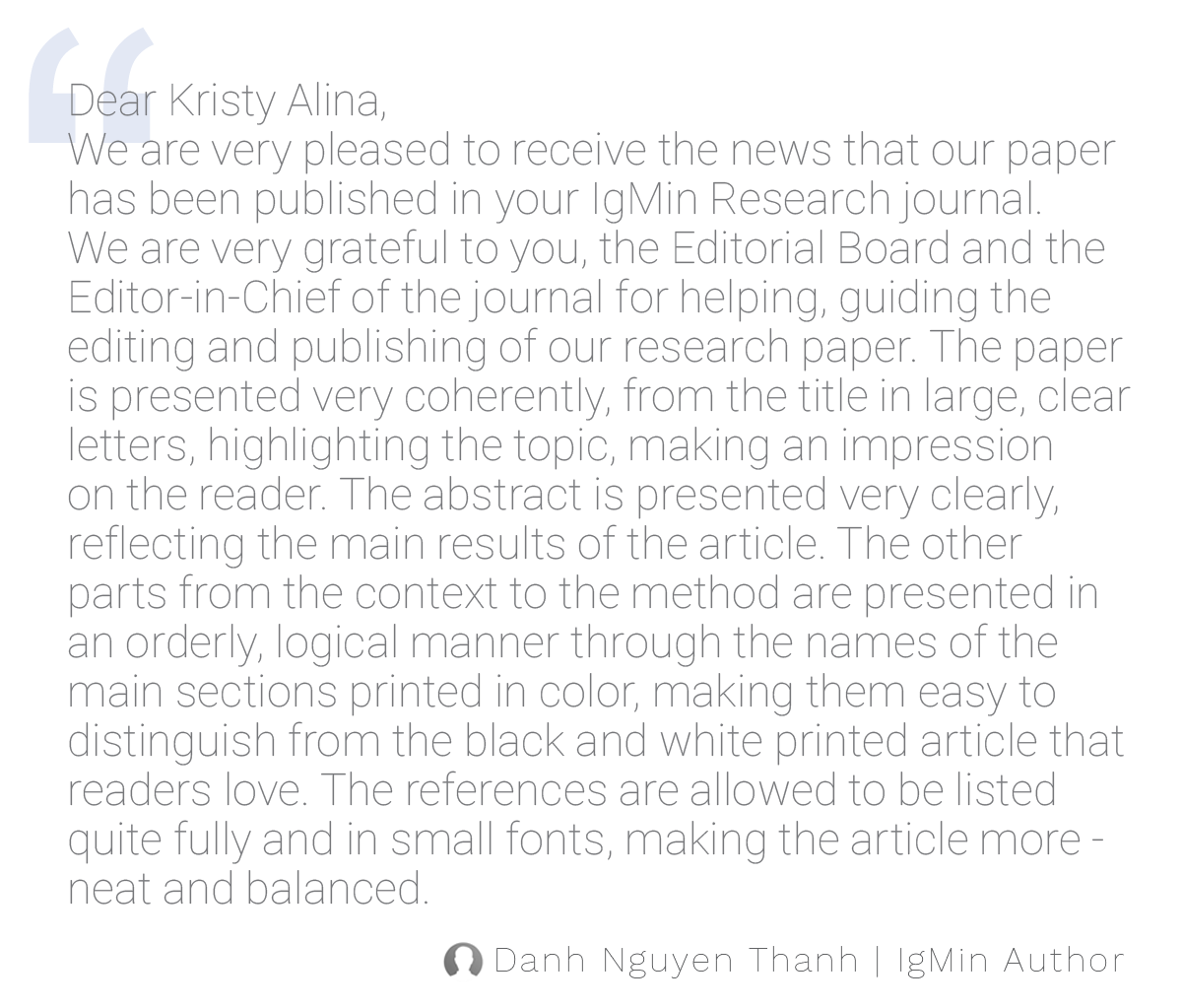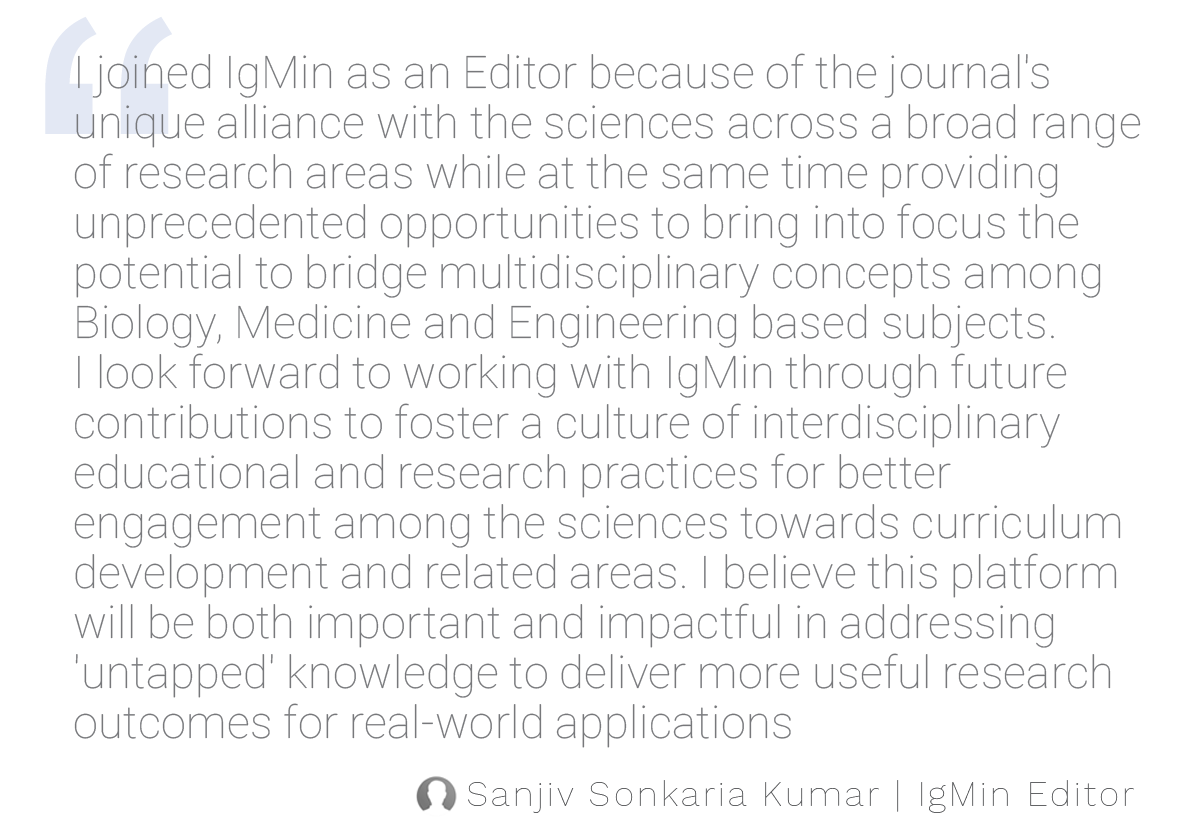Get Published Information
IgMin Research is a leading Multidisciplinary Journal dedicated to publishing cutting-edge research across various disciplines in the fields of Biology, Engineering, and Medicine . Our mission is to provide a platform for researchers and scholars to disseminate their work, promote interdisciplinary collaboration, and contribute to the advancement of knowledge.
Welcome to IgMin Research - A BioMed & Engineering Open Access Journal, where we offer an excellent platform for researchers and scholars to get published and contribute to the advancement of knowledge in diverse Biology, Medicine and Engineering disciplines. In this informative guide, we will outline the advantages of publishing with us, the editorial standards we uphold, the submission process, peer-review process, and our commitment to open access and ethical publishing.
Advantages of Publishing With Us
Publishing with IgMin Research comes with numerous advantages. Our journal is dedicated to promoting multidisciplinary research, making it an ideal platform for authors from diverse Biology, Medicine and Engineering backgrounds. By fostering collaboration between experts in various fields, we encourage innovative and groundbreaking research.
One of the key advantages of publishing with us is the rigorous peer-review process that ensures high-quality and impactful publications. Our expert reviewers evaluate the scientific validity, methodology, and significance of each manuscript, providing valuable feedback to authors to enhance the quality of their work.
Moreover, IgMin Research enjoys wide readership and indexing in reputable databases, which significantly increases the visibility and reach of published articles. Authors can be confident that their research will be accessible to a global audience, facilitating knowledge dissemination and potential collaborations.
Editorial Standards
At IgMin Research, maintaining the highest editorial standards is paramount to ensure the integrity and credibility of our journal. We expect all contributors, including authors, reviewers, and editors, to uphold ethical practices throughout the publishing process.
Our editorial team ensures a fair and transparent review process, promoting diversity and inclusivity in the research community. Authors can expect timely and constructive feedback from our reviewers, enabling them to improve their manuscripts for publication.
Submission Process
Submitting your research to IgMin Research is straightforward and convenient. Authors can use our user-friendly online submission system, which guides them through each step of the process. The system ensures that all necessary information and files are provided, streamlining the submission process.
Upon submission, authors receive an acknowledgment confirming the successful receipt of their manuscript. From there, our rigorous peer-review process begins, where subject-matter experts evaluate the research objectively, ensuring scientific rigor and validity.
Peer-Review Process
Our peer-review process is a critical component of maintaining the quality and credibility of the research published in IgMin Research. We believe in providing a fair and unbiased evaluation of each manuscript. As part of our commitment to transparency, authors can expect anonymity during the review process.
The peer-reviewers assess the scientific significance, methodology, and originality of the research. They also evaluate the clarity of presentation and adherence to ethical standards. Reviewers' comments are shared with the authors, enabling them to make necessary revisions and improvements.
Advantages of Publishing With Us
Publishing with IgMin Research offers numerous advantages. We provide a platform for researchers and scholars from various disciplines to showcase their work and contribute to the advancement of knowledge. Our journal promotes interdisciplinary research, fostering collaborations between experts in different fields. Authors benefit from a rigorous peer-review process, ensuring high-quality and impactful publications. Moreover, our wide readership and indexing in reputable databases enhance the visibility and reach of published articles.
Editorial Standards
Our editorial standards are of utmost importance to maintain the integrity and credibility of the journal. We expect authors, reviewers, and editors to adhere to high ethical standards and scientific rigor throughout the publishing process.
Overview: The editorial process is designed to ensure the fairness, transparency, and objectivity of the review and publication process.
Be respectful when you speak: We expect all parties involved to maintain a respectful and professional tone in their communication during the review and editing process.
Consent and morality: Research involving human participants should have appropriate informed consent, and studies must be conducted with high ethical standards.
Human embryos, gametes, and stem cells are used in research: Authors must address the ethical considerations and compliance with relevant regulations when involving human embryos, gametes, and stem cells in their research.
Research on gender and sex (SAGER): Studies related to gender and sex should follow the SAGER guidelines to ensure sensitivity, inclusivity, and accurate representation.
The use of animals in research: Authors must justify the use of animals in their research and comply with relevant ethical guidelines and regulations.
Investigations involving plants: Research involving plants should follow ethical guidelines and consider the potential environmental impact.
Research using fossils and other geological data: Authors conducting research on fossils and geological data should adhere to established practices and reporting standards in their field.
Twin use study of concern: Any studies involving twins should respect privacy and confidentiality and adhere to ethical considerations.
Requirements for complementary and alternative medicine research: Research on complementary and alternative medicine should meet specific requirements and ethical considerations.
Permission to publish: Authors should obtain the necessary permissions to publish any copyrighted material used in their work.
Registration of trials: Clinical trials must be registered in appropriate databases to ensure transparency and avoid publication bias.
Availability of information and resources: Authors should provide sufficient details and resources to enable reproducibility of their research.
Norms for reporting: We encourage authors to follow established reporting guidelines to ensure clear and transparent reporting of their research.
Introducing new taxa: Authors introducing new taxa should follow established naming conventions and guidelines.
Conflicts of interest: Authors must disclose any conflicts of interest that could potentially influence their research or its interpretation.
Authorship: Authorship should be based on significant contributions to the research and writing of the manuscript.
Artificial intelligence (AI): Research involving AI should meet specific standards, including transparency and interpretability.
Citations: Authors should provide accurate and appropriate citations to acknowledge the contributions of previous research.
Sharing and citation of preprints: We encourage the sharing and citation of preprints to foster collaboration and early dissemination of research findings.
Publishing in duplicate: Publication of the same research in multiple journals is discouraged and may lead to retraction.
Sharing of results before publication: Authors should exercise caution when sharing research findings before official publication.
Recycling texts: Authors should avoid recycling texts from previous publications without proper citation and permission.
Peer review: The peer-review process ensures the quality and validity of the research published in our journal.
Confidentiality: Reviewers and editors must maintain confidentiality regarding the content of submitted manuscripts.
Misconduct: Any form of research misconduct, such as plagiarism or data manipulation, is strictly prohibited.
Retractions and amendments: In case of errors or misconduct, retractions or amendments will be made following established protocols.
Complaints and appeals: We have a complaints and appeals process in place to address concerns regarding editorial decisions.
Special issues and collections: We welcome proposals for special issues and collections, focusing on specific themes within Biology, Medicine and Engineering research.
Supplements
Supplements are additional materials associated with published articles, such as datasets, images, or multimedia content.
Specifics to the query, please: For inquiries regarding supplements, authors can contact our editorial team with specific questions.
Production methods: Details about the production process for supplements will be provided upon acceptance.
Additional policies: Specific policies regarding supplements will be communicated to authors during the editorial process.
Information From Research
At IgMin Research, we value the dissemination of research findings and encourage authors to present their results with clarity and accuracy. Our journal welcomes empirical studies, theoretical analyses, and reviews that contribute to the advancement of knowledge in Biology, Medicine and Engineering disciplines.
Materials for Writers
IgMin Research aims to support authors throughout the publication process. We provide resources and guidelines to assist researchers in preparing their manuscripts effectively.
Overview: Authors can find comprehensive guidelines on manuscript preparation, ethical considerations, and best practices to enhance the quality and impact of their work.
Why write a book in english? English serves as the universal language of scientific communication, enabling global reach and collaboration among researchers.
Why Is effective writing crucial? Effective writing is essential for clear communication of research findings and ideas, ensuring readers can understand and appreciate the significance of the work.
Specialized editing services: Authors may benefit from specialized editing services to improve the clarity, organization, and language of their manuscripts.
What do editors of journals want? Understanding the expectations of journal editors can help authors tailor their submissions to meet specific criteria.
Study design reference managers before you start: Using reference managers from the outset helps streamline citation and reference formatting.
Decide which iournal to read: Familiarizing oneself with the scope and content of various journals aids authors in selecting the most appropriate outlet for their research.
Authorship: The criteria for authorship should be based on substantial contributions to the research and manuscript preparation.
Associated authors: Contributors who do not meet the criteria for authorship should be acknowledged for their contributions.
Acknowledgments: Authors are encouraged to acknowledge individuals or organizations that provided support or resources for the research.
Submissions from third parties: Authors should ensure proper permission and acknowledgment when including content provided by third parties.
Organizing your manuscript: A well-structured manuscript facilitates understanding and enhances the impact of the research.
Reporting guidelines: Authors should follow relevant reporting guidelines to ensure comprehensive and transparent reporting of their research.
Creating headings and summaries: Crafting clear and concise headings and summaries aids readers in quickly understanding the content and significance of the research.
Background results: Providing a comprehensive background and context for the study helps readers grasp the research's relevance.
Presentation of data: Effectively presenting data through tables, figures, and visuals enhances the clarity and impact of research findings.
Figure formats: Selecting appropriate file formats for figures ensures their quality and readability in the published article.
File types: Different file formats are suitable for various types of content, and authors should adhere to journal guidelines when submitting their work.
Additional documents: Authors may be required to submit additional documents, such as ethics approvals or data availability statements, to ensure transparency and compliance with ethical standards.
Sharing your software, resources and data: Facilitating the sharing of software, resources, and data promotes collaboration and fosters scientific progress.
Registration for trial: Authors conducting clinical trials should register their studies in appropriate databases to enhance transparency and prevent publication bias.
Analysis and recommendations: Authors should provide clear and well-supported analyses and recommendations based on their research findings.
References: Accurate and complete referencing is crucial for acknowledging prior work and supporting the validity of the research.
Overcoming linguistic obstacles: Authors for whom English is not the first language should take measures to ensure the clarity and correctness of their writing.
Ethics in publishing: Maintaining ethical standards throughout the publication process is paramount for upholding the integrity of scientific research.
Conflicts of interest: Authors should disclose any financial or non-financial conflicts of interest that could influence the research or its interpretation.
Brief resumes: Authors may include brief resumes highlighting their expertise and qualifications related to the research.
Peer review: The peer-review process provides constructive feedback to authors and ensures the rigor and validity of published research.
The benefit of social media for increasing views and citations: Authors can use social media platforms to promote their published articles, leading to increased visibility and citations.
Exchange of your work: Engaging with other researchers and academics can lead to valuable feedback and potential collaborations.
How can blogging benefit you? Authors may consider blogging about their research to reach a broader audience and promote scholarly discussions.
Why publish with us?
Global Visibility – Indexed in major databases
Fast Peer Review – Decision within 14–21 days
Open Access – Maximize readership and citation
Multidisciplinary Scope – Biology, Medicine and Engineering
Editorial Board Excellence – Global experts involved
University Library Indexing – Via OCLC
Permanent Archiving – CrossRef DOI
APC – Affordable APCs with discounts
Citation – High Citation Potential
Which articles are now trending?
Research Articles
- Kinetic Study of the Removal of Reafix Yellow B8G Dye by Boiler Ash
- Solar Energy Resource Potentials of the City of Arkadag
- Trend of SO2 Gas Dry Deposition in Vietnam
- Scientific Productivity of the Internet of Things (IoT) in 2011-2025: A Bibliometric Analysis
- Application of Virtual Reality (VR) in Facility Management Competency-based Training (CBT) in the Era of Industrie 5.0
- Improved Energy Valley Optimizer with Levy Flight for Optimization Problems
Advertisement










